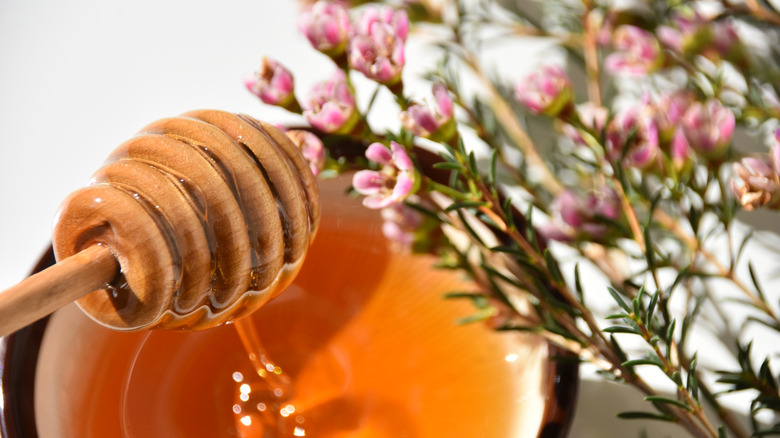The Real Reason This Trader Joe's Manuka Honey Lawsuit Failed
Another seemingly mythical "superfood," manuka honey has been all the rage for its multitude of health benefits, including calming inflammation, soothing sore throats, and improving digestion, according to Healthline. Furthermore, Comvita states that manuka honey is a "must-have item in every home."
It is known to be very sweet in taste and differs from regular honey in that it is darker and harder to spread, according to dietitian Anna Debenham (via HuffPost). However, more notably, it can be used to treat external wounds. Because of this, and the rarity of the manuka bush they are pollinated from, manuka honey retails higher than regular honey, costing up to $99 for 100 grams (via Business Insider). The article states that the plant can be found almost exclusively in New Zealand, which is basically the world's supplier of manuka honey.
So this begs the following question for many: Why is Trader Joe's only selling it for $13.99 per bottle? More importantly, how did those bottles lead to a lawsuit?
The lawsuit and why it failed
Trader Joe's has been under the limelight over allegations that it falsely marketed its manuka honey as "100% New Zealand Manuka Honey." C.K. Lee of Lee Litigation Group sued the company, claiming that in actuality, its product only contained 57.3% and 62.6% of manuka in tested pollen. This lawsuit was filed in 2018, according to Reuters, but the federal court decided not to take action in July 2021.
The beloved chain grocer was actually not found guilty of mislabeling its manuka honey as "100% New Zealand Manuka Honey," according to Bloomberg Law. One of the reasons for this is that the Food and Drug Administration (FDA) permits honey to be labeled based on the flower it primarily comes from, in this case, manuka. In addition, like regular honey, manuka honey is made through pollination done by bees. Bees that pollinated the manuka bushes could have traveled between other plants, resulting in a lower grade of manuka.

